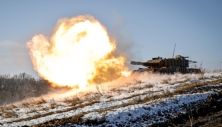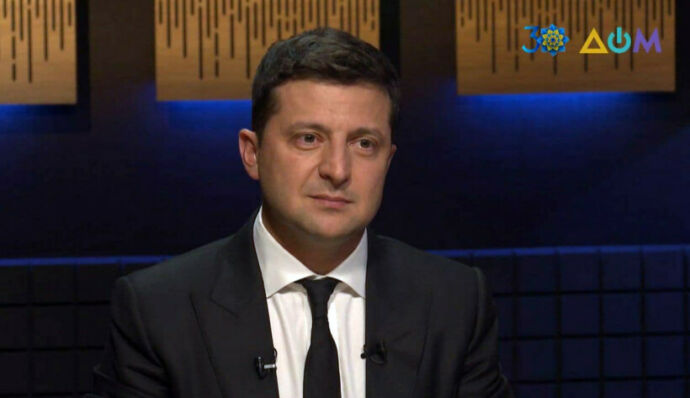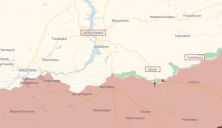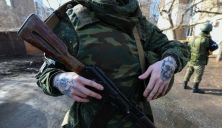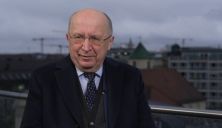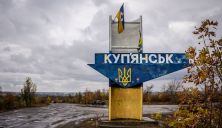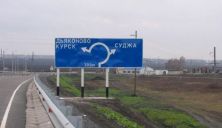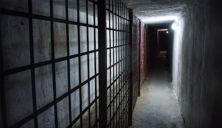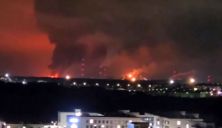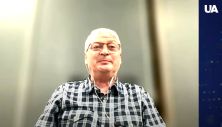President of Ukraine Volodymyr Zelenskyy gave a big interview to the “DOM” TV channel. The meeting took place in Donbas, in the city of Kramatorsk. It’s only an hour one can drive in the car to the contact line. It means that the head of state came closer to compatriots who reside on the temporarily occupied territories of Donetsk and Luhansk regions. That is why the president addressed most of his words to them. He wanted to support them, explain his actions and ask to stay strong.
Oleksiy Matsuka hosted the interview.
— Thanks for your decision to come here and dedicate some time for our viewers, who watch us in Donetsk, Luhansk, Simferopol, in Yalta. In general, everywhere, where our signal is broadcast today.
— Thank you for invitation! It’s a pleasure for me! You’ve said about the signal and places it covers, and it’s great that it covers such space. It is very important for people to hear us, to see that we know about them, love and remember them. And we know that they are with us, linked by the Ukrainian spirit. Of course, nobody will leave them. Unfortunately, such situation is unpleasant for us now, but at the same time it is a temporary situation.
— I also hope that it is temporary.
— Be sure.
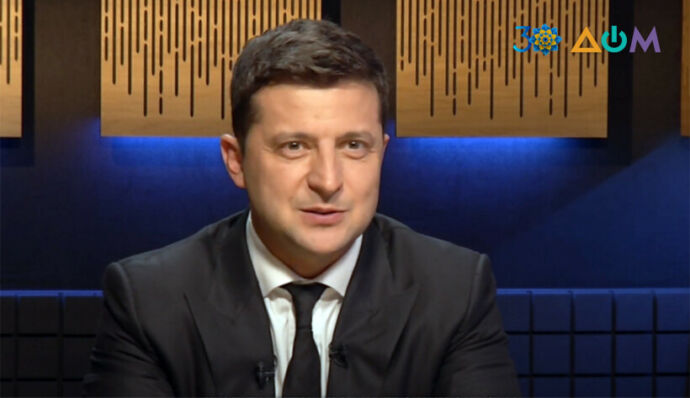
Russian history will lament over its steps
— In 2014 you were in Donetsk. At that time, you weren’t a president. We remember that period – especially days when the cities of Avdiivka, Kramatorsk, Sloviansk, Severodonetsk were liberated. Those are days we remember from year 2014.
What was year 2014 for you? Can you recall and tell your impressions, feelings? In April of 2014, you had a concert of “Kvartal 95” in Donetsk. I know that many of your friends from the “Kvartal” – for instance Yevhen Koshovyi – come from Donbas.
— We all have connections with this region: it’s life, childhood, youthhood. Yevhen has relatives there, his closest ones. Those are memories. They are still living there. Zhenya’s relatives are in Alchevsk, and Luhansk. Mika Filatov has relatives there. Concerning your question, I will start from the first part.
It was painful. Probably it was everyone’s first impression. Nobody understood a thing. In 2014, there was a concert in April. In general, I have always been happy to come to Donetsk with our team. The concert halls were full of good mood, pleasant emotions and humor. There were viewers, full halls and there was humor, different and sharp. And not only humor, but certain dramatic moments were present as well. Our songs were very, very patriotic. I remember that I was called for an interview. This is the feeling I have now – it is very similar.
I was asked for an interview after the concert. In the morning. We were leaving that day, and there was an interview. We were asked: “What do you think? Whose Donbas is? Do you see what is happening?” I say: “Whose is Donbas? It’s ours”. I don’t remember all the moments. But I recall I had a strange feeling, as if something had happened, as if I woke up in another world, in another country. I met some young guys, who were passing by and shouting: “Oh, hi there, Vova!”, or something like that.
Who could ever think what had happened? They went with different flags: Ukrainian and others. It looked very strange. I said, “Guys, what are you doing?” They said: “Wow, let’s takes pictures!” And I say: “It is not the time. What are you doing?” They answered: “Oh, well … listen, it’s only work”.
That is, who would have thought that those words will become bigger than just words. And then the occupation of our Ukrainian Donetsk and Luhansk happened. I perceived it as something strange. But, on the other hand, we were used to live in that atmosphere, that people come and strike: someone is “for the matter”, and someone was just getting money for this. Even without understanding what were they doing, or what have they had. Using such manipulations, such steps – one can never think where they can lead to.
I had a feeling of “something unpleasant” in the morning, differing much from the good impression from Donetsk I had in the evening. I remember, we sat in the bus, and I had a bad feeling. These are my memories from the very beginning. And then it seems to me that it was an abyss – I mean, the situation. Just the abyss. You know, like something, written in sci-fi books. An apocalypse. Everything had changed suddenly. Like, the day before we walked along these streets, we were chatting near the “Donbas Arena”, we were talking about how to get tickets there. And suddenly everything changes. Everything broke like a glass that fell on the floor. This is the memory that remained. I really want to turn back everything. I believe that we will return Donetsk and Luhansk. I am sure it will be so.
— Well, you were staying in Donetsk that day. You spoke about unity, you already understood…
— Yes, I understood. I had a feeling of pressure from outside. And in this sense, I have a good intuition about people. And the feeling, when it is something uncomfortable that is present. When you come somewhere, and you are not happy, you feel uncomfortable.
It seemed like people around are good, but something is wrong. Then there was a feeling: people are the same, but something is wrong. Something is happening.
— After that you started visiting the ATO zone more actively?
— We tried to visit every place we could. Yurii Stepanovych addressed us, our company – he is a serious volunteer. He collected information from different cities, military bases. And then, when the war started, we supported our military.
— Unfortunately, it happened. All these years we are still living in such a reality. You suggested to imagine how we walk in Donetsk, come to the “Donbas Arena”, where the full tribunes sing the national anthem. I have found a ticket for one of the matches there and I want to give you a memory, so that you always have a connection with these events. It will remind us from the past of the things to be done in the future. You know, these are the special signs. Everyone, who left the occupied territories has the keys from the apartments they lived in, and all this time the keys remain with them.
— I have a key from one’s apartment.
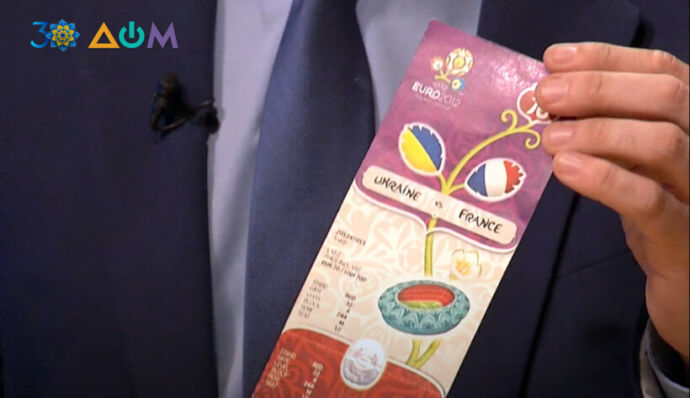
— During a press-conference in Mariupol on October 30, 2019 you suggested three stages to reach peace. The first stage is the end of the “hot” war, the second stage is reconciliation, and the third is safe reintegration. That is three stages, three groups, so to say: political, security and humanitarian. What do you think about the first steps to be made when talking about models of the future for Donbas?
— I still believe that it is impossible to negotiate anything with people with guns in hands. Negotiations are not just a talk. This is a serious conversation. I have always advocated that it should be the first article of the “Minsk” and other arrangements. But, in general, it’s not a matter of “Minsk”, and it’s not even about how many people believe in “Minsk”. The matter is: fire has to be stopped. And someone – you know who – was laughing at me for a very long time when I said: “Listen, in order to talk, we need to stop shooting. Otherwise, will we ever manage to talk?” This is a fact. And why? Because we had this truce in Ukraine. This ceasefire lasted for seven months. During five of which there were provocations from that side, there were the wounded. But there also was the general feeling that we really can avoid victims.
It’s personal to me. When I left the building of the university in Mariupol, I just asked people I saw in the streets: “Well, how do you live?”. They said: “It’s quiet. We don’t hear shots”. It means that the ceasefire works, it means we can continue trying further. And what’s next? The next stage is the withdrawal of troops and weapons. We have to negotiate our careful actions, very careful actions to come to the border. Because this is our border. I understand everything. We have information difficulties. Some people are somewhere “there”. Instead, I want to tell them that they are here, in Ukraine. Some people are crushed, filled with false information. Someone has even crossed the contact line to come to Ukraine and didn’t find the slightest support: they believed us, ran away from militants, arrived here and didn’t find themselves. The state hasn’t managed to provide them with job or apartment. This is life. Unfortunately. And what was next? They returned to occupied territory, having lost hope. Of course, it is a very difficult situation.
That’s why we say that the humanitarian mission means conversations, dialogues, agreements and their fulfillment; it’s pressure on Russia to fulfill its commitments. It is a party to the conflict. Mind that Russian Federation is constantly avoiding the formulation that it is a party to the conflict. We had some not very pleasant negotiations in Minsk in video format, when Germany and France tried to carefully say that Russia is a party to the conflict… but, in general, you can understand the further reaction. In this sense “cautiousness” – it doesn’t work, I guess. We should all understand during the Minsk talks and in the Trilateral contact group, that the parties to the conflict are Ukraine and Russia. Everyone should understand this. People in the occupied territories also understand it. Even those who watch us talk and don’t believe me, somewhere deep in their souls, they know I’m right and tell the absolutely honest truth.
Believing in this means to acknowledge that one has been mistaken all these years. That all this “we are a single people with Russia” is a mistake. One did believe in it, but it’s not true. I always said: we should share two things. Yes, we have things in common. We should not say that all Russians hate Ukrainians. It is not true. It’s a fake, broadcast in Russia as well. This includes the talks that Ukrainians hate Russians. This is not a complete truth as well.
These are important humanitarian aspects we should carefully handle. There are many Russian people who support the united Ukraine, support Donbas and see it only being Ukrainian. They know the situation and they feel bad about it. And in general, they fell shame about everything related to the Crimea. They are very ashamed. All of them say that there will be tears. Russian history will be lamenting over its methods and decisions concerning Crimea. why do I say “Crimea”? I didn’t mention “Donbas”. It’s not because the situation in Donbas is less complicated. It’s not true. We have much more deaths in Donbas – many thousands of people. I said so, because the Crimea was the first match, it was the first light, through which two nations were separated. They were divided for a generation or two – that is the current attitude. They don’t want to see; they don’t want to hear. Many Russian-speaking Ukrainians have started speaking Ukrainian. Yes, we all speak Ukrainian language, but some decided to speak Ukrainian, because they were ashamed to speak Russian in this situation. See?
This is because one’s brother, father, or relative was killed. I realize that there are many Russian people who support us, Ukrainians. And they face problems there sometimes for their beliefs. But returning to the aspects we talked about, I think, first of all, people in the occupied territories of Donbas and in the Crimea are in a complicated situation. In dangerous situation. It’s difficult and very dangerous. But they should not agree with what is happening there, with the fact of occupation. They should celebrate the independence day. Yes, celebrate it! I understand, maybe quietly, not hanging a flag on the balcony, because they could be killed there for such actions. Take care of your lives. but also talk to your children about Ukraine, that it is their home.
More important than any bullet
— On August 24th we will mark 30th anniversary of independence of Ukraine. The 30th anniversary – isn’t it an occasion for unity for such people? In your opinion, what could be the reason for the people to unite? What else could unite people who are forced to live on the other side of the contact line?
— Look, first of all, if we want to return Donbas, we have to understand and I always said this: the territories are important. But local residents – they are on the first place. Because it is difficult for people there to resist information attacks, face complications in everyday life, and remain Ukrainians in the head, in the soul, and in the heart. It’s difficult because people have to survive there. As a father I understand that it’s important to bring up children somehow. I know how difficult it is for them. Just think about teachers, for instance, who live there – they have to do their work very carefully and in difficult conditions. They need to speak with children. We should somehow remember that these are children, and you should try to give them objective information. This is the task. And this would be an information victory. This is more important than any bullet. This is much more important. And that’s what people should do in Donbas. What should we do? We have to… Let’s take your channel, for example.
— This is, by the way, for the first time, when for budget money we started broadcasting especially for these people, for these territories.
— It’s important. It’s not a question of finances. It’s a question of our values. They are really our people, they are Ukrainians. This is our home. Ukraine is our home. And we want to broadcast there, and we tell them: “We live with you in the same house. We are now – temporarily – in different rooms. But we are all under the same roof”. We have to provide them with information. We can also avoid phrases like “information attacks” or “war” etc.
We need to simply talk to people who live there, not to lose this connection, our connection that still exists. We must speak. And in general, I used to say about this when the law and amendments to the budget, concerning the “DOM” TV channel, were passed. I don’t think it’s correct to broadcast this channel to only temporarily occupied territories. I will explain why do I think so. We know that millions of people left Donetsk, Luhansk, and other cities – they came to the territory controlled by Ukraine. They live here, work, etc. And it is very important for them to see that we are talking about people in the occupied territories. It is very important for them to see and hear it. and that’s why the “DOM” TV channel is not just for those who are staying “there”.
“DOM” TV channel is for everyone who resettled to the government-controlled territory. This channel should unite people, because there is a horrendous contact line between them, between even residents of Donetsk: some of them are there, and others are staying here.
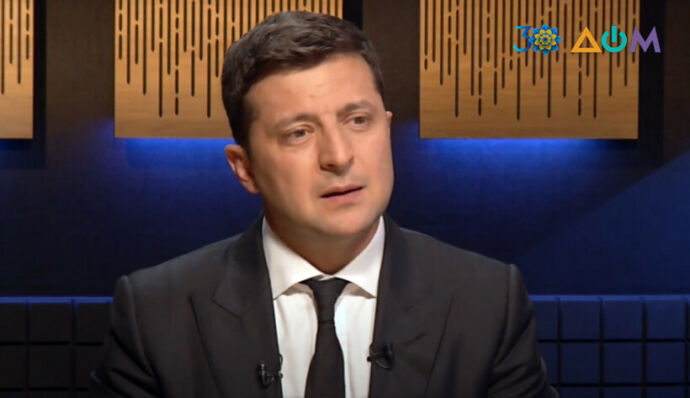
— Basically, there are people who think we left the city and forgot it, but that’s not true.
— Exactly. That’s why we can’t forget anything. Never! Like, one had been living in Alchevsk, for instance, worked somewhere. This should be remembered. If one managed to leave danger behind – it’s great. If not – it is not the end. But one shouldn’t lose this this information link. Because, I think, those things are a priority.
As for all members of team working upon “Minsk” and upon other issues – frankly speaking, I think the fact that we’ve managed to agree ceasefire and return some 150-160 persons – I think it’s a great deal and it’s wonderful!
It’s great to return more people than we lose. We returned those people from captivity. It means families. Some 150-160 happy families! Everything is important in this issue. It seems to me that it’s important not to stop and continue working. Don’t separate those things and people.
Very often journalists ask me: “What’s next? There has to be one more stage. People want certainty”. But, unfortunately, I can’t guarantee that there would be some certain, concrete documents foreseeing further steps. It’s a gradual process. Step by step. We do what we have to do. Yes, there could be problems, like, when they told me: “You’ve promised to end the war in a year!” Of course. of course. I really want it. I do everything for this, but, unfortunately, not everything depends on me.
Today I believe – and I am absolutely certain about it, and the president of the Russian Federation knows my opinion very well – 90% of success in the return of Donbas, in the de-occupation of our territories depends on one person. You know this person and you know that he has to live with this. And people in Donbas should understand it. They should not live with any illusions, hoping for some “ifs”.
Of course, we gather international partners. Believe me, we have a plan. But we also need the will – political and personal will.
— There is, obviously, Ukraine’s will to reach peace. Political and diplomatic.
— Absolutely! We have it. No one wants escalation. Again and again we face lies. They use to say: yes, no one wants escalation etc. But I’ve seen the web-sites, different web-sties of the so-called “republics”. I was shown some articles, saying: “Zelenskyy ordered to send rockets and tanks”. But it’s all lies. We had to fire in return only when the militants fired at our military positions. We’d never violate the ceasefire. And the guys stood still. They understood that there were provocations. And they reacted professionally. However, sending weapons to shoot and kill peaceful residents… It’s a complete lie. The other side shoots civilians.
— Almost all checkpoints are closed in the uncontrolled territories. To deprive our citizens from their pensions.
— Checkpoints are closed. That’s a fact. And, by the way, pay attention to it. Look at the situation carefully. And everyone should do the same – this is one of those points, confirm that everything depends on the president of the Russian Federation. During the summit of the Normandy Four we agreed the issue of the checkpoints. I stand by my word. We built everything, we brought everyone there: officials, journalists, ambassadors, and others. Locals also shared their problems, talking about ambulances that couldn’t reach the destination because of some problems in Stanytsia Luhanska etc.
In the first month of my presidency, we built and opened new checkpoints. After the meeting of the Normandy Four we opened all the checkpoints. We did everything we have agreed upon. And there is nothing from their side. That’s what the problem is: there is no will. Even having all the opportunities. They can’t say “well, there’s just no money.” It’s not so. Their checkpoints remain closed. They’ve just closed them.
We have evidence that this is their will. We all have a video footage. There you can see the humanitarian cargo. We have agreed the entrance of the cargo in Novotroitske – after that the cargo left our side and went to the temporarily occupied territory – they opened the checkpoint. But it is closed for people, willing to leave the territory. They simply don’t let them out.
Why are all of those checkpoints important and needed? Why are they closed from the side of the occupied territories? Because when people address them, they can receive already up to 87-90 services. Whatever one wants. One can either receive a document, pension, package, send money, buy a cell phone, charge it, etc. It’s an up-to-date service.
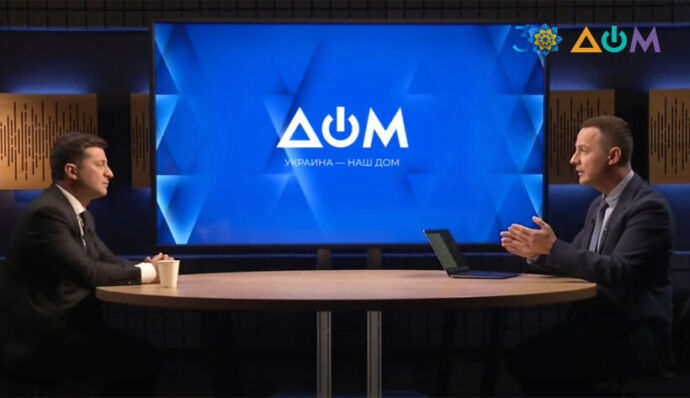
— By the way, the volumes of humanitarian cargo from Ukrainian side significantly exceed the volumes Russia sends under the guise of humanitarian assistance. This is the accurate statistics. It’s Ukraine that provides access to all the humanitarian aid, that comes from the red cross, the un mission and others.
— As for the Red Cross, I’ve also had an agreement with the president of Russian Federation that the Red Cross will have access to the temporarily occupied territories. They will study all the problems. We don’t need anything; we will deliver everything. But is it possible to visit our people in prisons? Visit those who are in isolation facilities? Is it just possible for the Red Cross to go there? The Red Cross will see the problems, give them medicine, send medics, etc. All of this has been confirmed. They said there will be an opportunity. But there was no access to the Red Cross since our arrangements.
Don’t divide people by passports
— Russia continues forcefully issuing its passports in the occupied territories. People are forced to get those passports. At the same time in Kyiv, there are individuals who are very radical in the issue of evaluating the fact that our people are forced to get documents from the Russian Federation. How do we have to respond to this? What answer should we give to people who may be afraid of such reaction in Kyiv, while residing in Donetsk, in Luhansk, or in Simferopol?
— I think the answer should be reasonable and sober. It should be wise and, most importantly, thought over. There are some individuals who are very radical in their appeals. I’d like to advise them to think a bit about the situation their compatriots there find themselves in. They should understand that sometimes the situation could be desperate.
Of course, I pay great respect to those who was able to refuse passportization and stay with a Ukrainian passport. Of course, we are very grateful to them. We can just imagine how difficult it was for them. I understand it. But people are different, circumstances are different.
You know, people just cannot find job there. That is why it is not my complaint to such people – it is my compassion. And I think that we should understand this: we should understand that situations are different and people cannot be divided by passport. A person needs to be perceived completely differently. There are certain situations, we all cannot evaluate correctly and adequately to the end without passing through such trials. That is why I think in this sense, in the sense of passportization, it is difficult to talk about people. There can’t be a single answer.
However, talking about Russia, about passportization it started, the situation and answers are simple. Russia violates everything. Absolutely everything – international law and other laws.
The second story with passportization is elections to the State Duma. Ukrainians having these passports are forced to vote with those Russian passports. This concerns public services, schools, kindergartens – they take the employees to the buses and force them to vote with Russian passports. This is slavery.
But, as history shows – consequences of such actions, such steps – disappear with time. You know how? Like after the rain, all this will be washed away, all will pass. Probably there will be one line in some books: well, there was passportization in the history of Ukraine, temporarily. The territory of Donbas was occupied. But then the occupation was over and everything returned back to Ukraine.
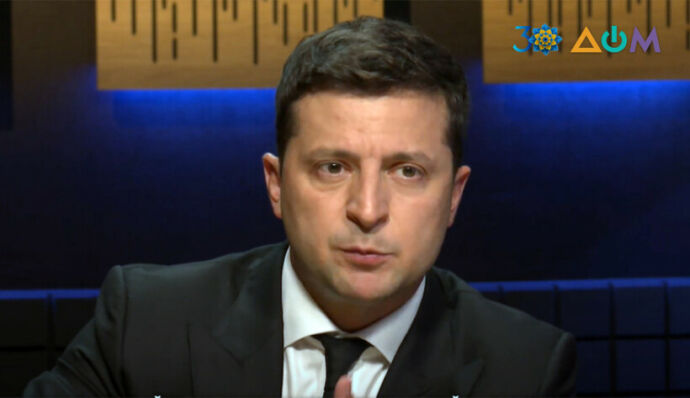
— The more opportunities and accessibilities are provided by Kyiv for ordinary people on the contact line, the more limits the other side invents. And please note how the self-proclaimed “governments” behave and react to the actions of Kyiv – they continue blocking any contacts.
— Be sure this period of occupation, passportization will pass. It is impossible not to be a Ukrainian and love all these territories. Simply impossible. I know that contacts are blocked. But I am convinced that it is impossible to do it always. Just look – you either love this country or do not love it. If you love – you are Ukrainian. If you don’t – you are just a guest, a traveler. Those people who occupied our lands will never love Crimea the way we love it. It is impossible. It’s an impression from childhood, the unique nature, the sea that belongs to you only, seafood you’ve tasted for the first time – everything like in childhood.
It is impossible to forget. It’s like the dearest memory. As for me, I know this Crimea, I tasted local treats, I used to climb mountains, I lived in tents, I jumped of a 14 meters high cliff to impress my future wife. I jumped though it was scary. It’s my memory. I lived there. This is my land.
Same story is with Donbas: these are the moments when you see those places, when you walk along those streets. When you know everything, all those miners’ towns etc. It is impossible to forget. Look, we are building roads in the Donbas. Why? Because we want the roads to be built there. We simply want this.
— At present the situation is absolutely different. The Donetsk region’s life today is not the same it was before. When you go to Mariupol from Zaporizhzya, it is a completely different story.
— I believe that people who governed the country earlier just hated it. I’m very serious about it. I think they hated this country. Why do I think so? They didn’t do anything: they didn’t build roads, didn’t plant trees. They didn’t want it. They simply hated their country. And it’s not in terms of love/hate categories – they were just made for another country, they are citizens of other countries. They were here temporarily. They were ad interim managers. And they would surely leave to other countries after their job is over. Their heart is not here.
You may have been born here, but it’s not yours. And that is why all this occupation and all those Russian “comrades” who were forced to help those militants and others – this is not their land. They will not be here. Their generations will not grow here. And their children are not here. And they will not die for our land. That is why we differ. And we differ a lot.
That’s why, from the point of view of information, recalling what you’ve started with, one has no right to say: “If you have some other document – you are not our person”. No. No! Calm down. One has to calm down. The main thing is in your soul and heart. The main thing is where you hide the Ukrainian document. Of course, it is dangerous, and I will understand you. We will never refuse from the people.
The wall will fall
— During the sociological research, in focus-group research, we often hear the following answer from people coming from the uncontrolled territories: they do not feel “normal”. That is, they didn’t become a part of Russia, as, maybe, someone hoped, and at the same time the connection with Ukraine is not fully maintained. Is there any concept of “normality” to be shown them?
— As for normality. Look, it is difficult to determine who is “normal” and who is “not normal”. It seems to me the most important thing is how you act. There’s a period of uncertainty. A person often doesn’t know what to do. They are choosing and cannot choose. They can’t know their place in all this. The most important thing in this story is to realize oneself and understand the importance of self-determination. Are you a Russian? Are you in Russia? And I’m not talking about ethnicity. What way have you chosen? Are you a Ukrainian? If yes, this is your land.
It is very important to understand why do you have to do it. I think that people living today in the occupied territories of Donbas and Crimea should understand exactly. No one is talking about expelling anyone. I just want to be understood correctly: is Ukraine your homeland or you are a guest?
In my opinion, if you live in the temporarily occupied territory of Donbas today, and you think: “My deed is right, our fate is with Russia, we are Russians” – that would be a great mistake for you to continue living in Donbas. It will never be a Russian territory. Just never. it doesn’t matter how long it will be occupied, do you understand? It’s like a wall that once stood in Germany. Was it relevant? Anyway, people and history will find the moment – and the wall will fall. Even if negotiations fail now, sooner or later people will make use of the moment. It’s impossible that it last forever. Therefore, I think, if you love your kids or grandkids and you love Russia, if you used to live on the territory of Ukraine, but you felt that “this is Russia” – if you felt like this, you have to understand: for the sake of your children and grandchildren you’d better go and find your place in Russia.
It is a right thing to do. Because there will be no civilization in this territory without Ukraine. Ukraine will grow up; it will build everything. Given the current circumstances – being cut off Ukraine, or occupied – Donbas has no future. That is why there will be no happiness for these people. But if you feel that you are Ukrainian, and Donbas is Ukrainian – know that all this will change.
If you respect this flag, if you respect the Ukrainian language – even if you have not been taught it at school, read the books. Everything is ok. Speak as you want. If you feel that you are Ukrainian – stay strong! This territory will be de-occupied sooner or later. This is history. Therefore, there is no “normal” or “not normal” here. The only question that matters is: Who are you? Give an answer for yourself. I’ve always said that there are plenty of rich people here in Ukraine, who go somewhere to Monaco, Italy, open bank accounts there, build houses, live there. They live there and then for some reason return to Ukraine.
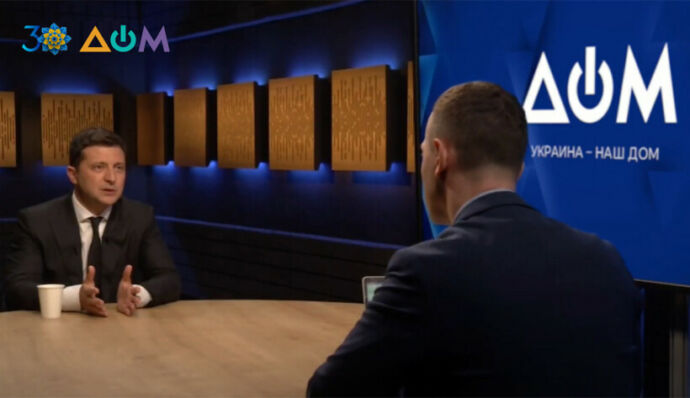
Are they normal or not normal? They have no problems at all. But they are immigrants there. They will never be Englishmen in London, for instance.
— They’d never become.
— Never! For sure. The same as we are. We are Ukrainians, we feel normal, not immigrants, only on our territory – in Ukraine. That is why the same situation is in Donbas and in Crimea. Well, one will not do anything there in this context. You see, it is impossible to say in the Crimea that the Crimean Tatars don’t have history and past. That they didn’t suffer deportation. and that they have invented all this. You can try to rewrite history, you can rename all the cities – Yalta, or Bakhchisarai. You can try to erase this history. But it’s impossible to be done completely. All of them will return home. It’s a matter of time.
